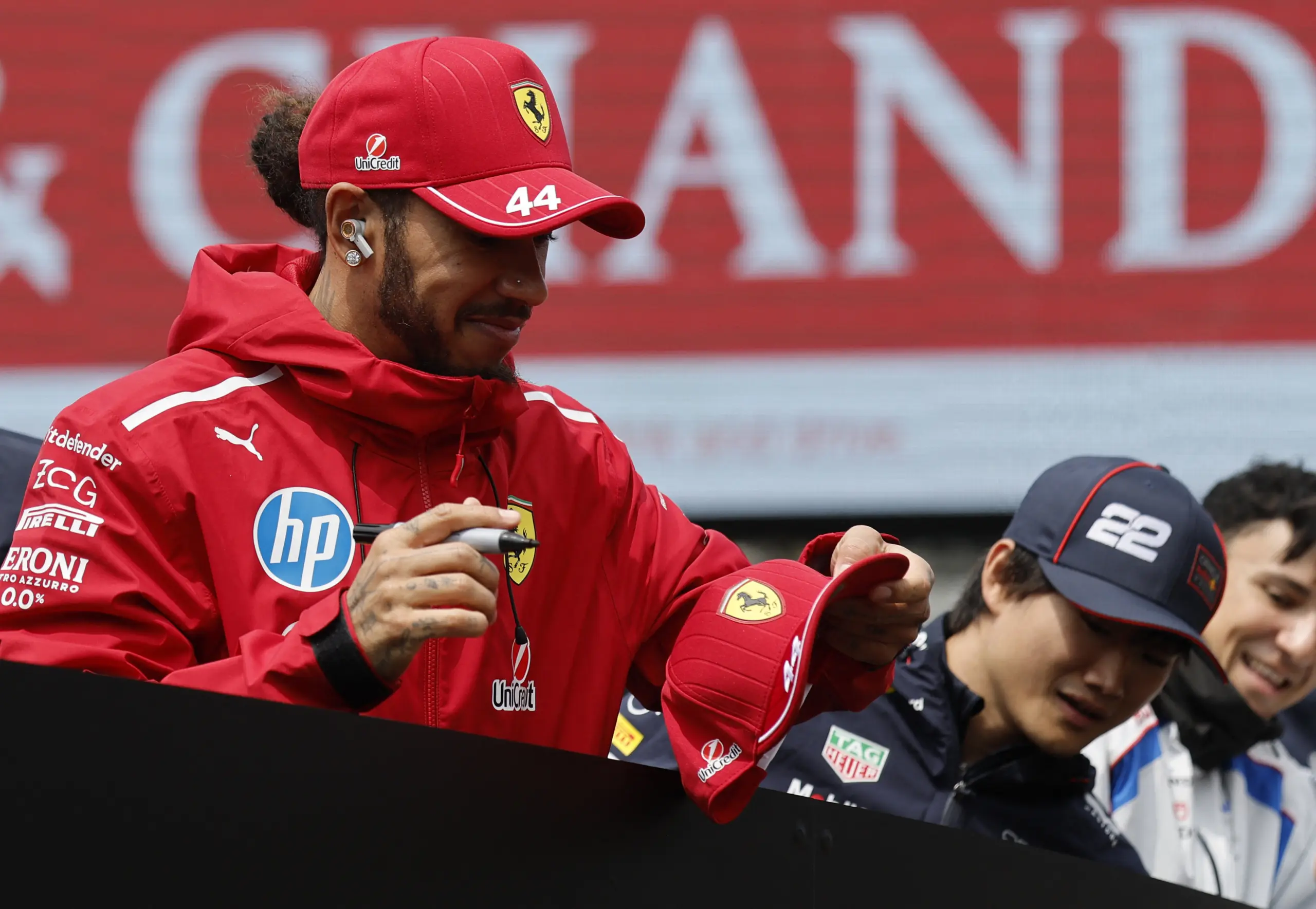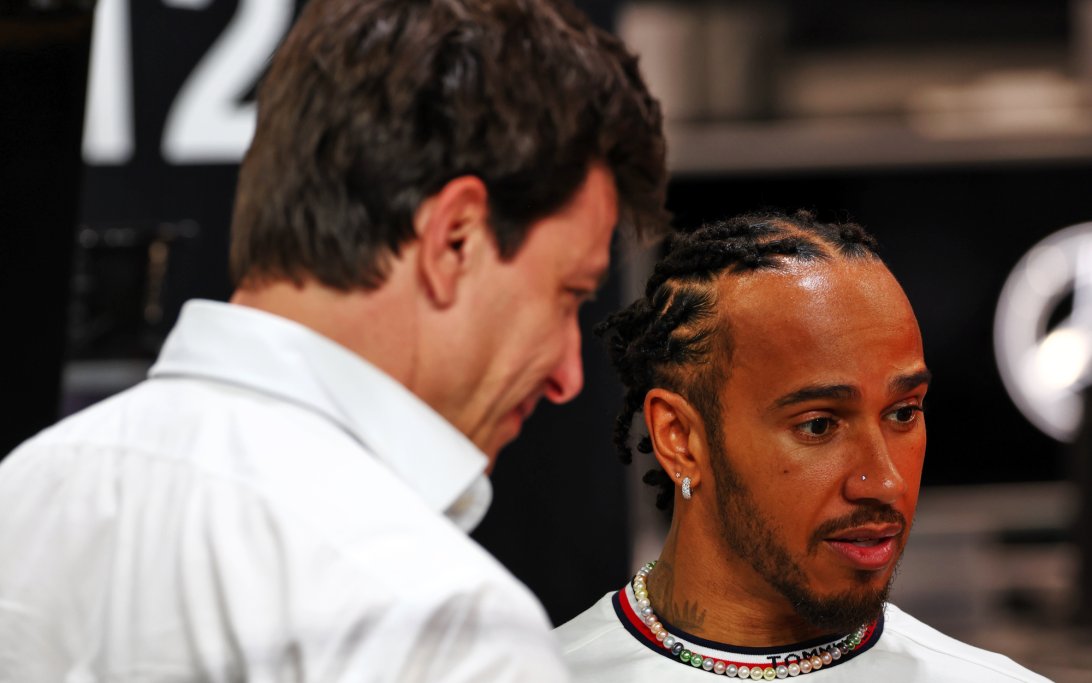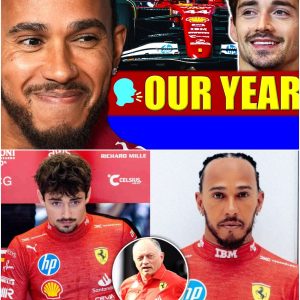Toto Wolff has just delivered an unprecedented statement about Lewis Hamilton that challenges everything we thought we knew about the seven-time World Champion’s struggles, especially at Ferrari. This isn’t just a public relations maneuver or damage control; it’s a declaration that rewrites the narrative of Hamilton’s turbulent season and sheds new light on his emotional outburst after the Hungarian Grand Prix.
Hamilton’s performance at the Hungarian Grand Prix weekend was nothing short of catastrophic. In qualifying, the seven-time World Champion was knocked out in Q2, landing in 12th place. His teammate, Charles Leclerc, on the other hand, secured pole position, a stunning achievement that left Hamilton’s poor showing in the shadows. The gap in performance between the two drivers was stark—Leclerc, in the same car, started from pole, while Hamilton was left languishing in 12th.
The race on Sunday proved to be even more disastrous for Hamilton. He was caught in a DRS train, unable to make any progress up the field and, ultimately, finished not just outside the points but a full lap down from the race leaders. It was a bitter pill to swallow for the Brit, who had already been battling frustration and self-doubt.
In his post-race interview, Hamilton’s frustration boiled over. “I’m absolutely useless,” he admitted, a comment that sent shockwaves through the motorsport world. “They probably need to change driver,” he added, an emotional admission that seemed to signal the end of an era. These words weren’t the polished responses we’re accustomed to from the seasoned champion. Instead, they were raw and unfiltered, a true reflection of the devastation Hamilton felt in the aftermath of the race.

The media went into overdrive, with speculation running rampant. Retirement rumors about Hamilton began to surface, fueled further by his cryptic Instagram post, which featured black-and-white images of a matchbox with the caption, “We’ve struck the match. Now follow the smoke.” The timing was unmistakably deliberate: after one of his worst performances in years, Hamilton dropped a teaser that seemed to hint at something major—perhaps a career change or a shift in direction. The F1 world was on edge, wondering if this was the beginning of the end for Hamilton.
However, Toto Wolff, the Mercedes Team Principal and Hamilton’s long-time confidante, shattered the narrative with an explosive statement that changed everything. Wolff, who has been by Hamilton’s side for six of his seven world championships, stepped forward to offer insight into the emotional outburst and its significance.
When questioned about Hamilton’s outburst and whether it signaled a decline in the champion’s career, Wolff gave an unexpected response: “That is Lewis wearing his heart on his sleeve,” he explained. “It was very raw. He was doubting himself.” Wolff’s comments revealed something crucial about Hamilton’s emotional makeup. He wasn’t speaking out of weakness but from a place of genuine vulnerability. According to Wolff, Hamilton had displayed this kind of emotional transparency since he was a young boy. When he feels that he has underperformed, Hamilton doesn’t hide his feelings. Instead, he confronts them head-on.
Wolff went on to reinforce Hamilton’s legacy as one of the greatest drivers in Formula 1 history. “He’s the GOAT, and no one is going to take that away,” Wolff said emphatically. “No single weekend or race season that hasn’t gone to plan will change that.” This statement carried immense weight, given Wolff’s intimate knowledge of Hamilton’s capabilities and their dominant partnership at Mercedes. Hamilton’s reaction after Hungary wasn’t a sign of decline, but rather a moment of reflection from a driver who demands nothing less than perfection from himself.
Further insight came when Wolff revealed that the struggles Hamilton faced were not due to age or diminishing ability but rather to the technical challenges that have plagued the sport since the introduction of new aerodynamic regulations in 2022. The ground-effect cars, designed to generate downforce using Venturi tunnels, have been a significant issue for Hamilton’s driving style. These new cars are notorious for porpoising—a phenomenon where cars bounce violently at high speeds—and it has been particularly challenging for Hamilton. Wolff admitted that these technical challenges had hindered Hamilton’s ability to perform at his usual high level. He has simply not gelled with the new cars, a fact that has been exacerbated by the struggles Mercedes has also faced under the new regulations.
Looking to the future, Wolff sees hope for Hamilton with the 2026 regulation changes, which will overhaul the current car designs. These changes, which will restrict the use of Venturi tunnels, could potentially eliminate the porpoising issues that have plagued Hamilton’s performances. Wolff remains confident that Hamilton has the ability to win an eighth championship, but only if he is given a car that aligns with his driving style and provides the necessary feedback to perform at his peak.

In the meantime, the statistics behind Hamilton’s struggles at Ferrari are difficult to ignore. He currently sits 42 points behind in the standings and has yet to make it onto the podium in 2024, while his teammate Charles Leclerc has been on the podium five times. The gap between Hamilton and Leclerc in qualifying in Hungary was just 0.25 seconds—a margin that usually wouldn’t result in such a massive difference in positions. This highlights the razor-thin margins that define modern Formula 1.
Ferrari Team Principal Frederic Vasseur acknowledged the brutal reality of the situation: “When you are a seven-time world champion, your teammate is on pole position, and you are out in Q2, it’s a tough situation.” However, Vasseur also made an important distinction between frustration and demotivation. “Honestly, he’s frustrated but not demotivated. It’s a completely different story,” he said, emphasizing that despite his public frustration, Hamilton remained committed to improving the situation.
In a surprising turn of events, Charles Leclerc, who could have remained silent and enjoyed his position as Ferrari’s clear number one, chose to publicly defend Hamilton. Leclerc called Hungary a one-off and expressed confidence that Hamilton would bounce back stronger after the summer break. His public support wasn’t just good PR; it was an example of leadership and maturity—qualities Ferrari needs as they navigate the challenges of aligning Hamilton’s needs with the team’s philosophy.
Despite Hamilton’s current struggles, Wolff’s confidence in his enduring ability remains unshaken. “I hope he stays on for many more years,” Wolff stated. “Next year is going to be an important one.” The 2026 regulation changes may just be the turning point that Hamilton needs to revive his title aspirations and rewrite his story with Ferrari.
However, Wolff’s most telling statement was about the current state of the Ferrari car. If the car doesn’t provide Hamilton with the feedback he needs, Wolff believes Hamilton will continue to struggle. The Ferrari machine, much like the Mercedes of recent years, has failed to meet Hamilton’s expectations, and the current season has shown just how problematic that can be.
What’s clear from Wolff’s statement is that Hamilton is far from finished. His recent struggles are not indicative of a fading champion, but rather the result of technical limitations and a challenging driving environment. As Wolff said, “Champions aren’t defined when things go well. They’re forged in moments when everything seems to fall apart, and they choose to keep fighting anyway.” Lewis Hamilton isn’t done yet. If Ferrari can align their car to his needs and provide the necessary support, this partnership might just be the beginning of something truly special.
In the end, Wolff’s words weren’t just a defense of a friend—they were a reminder of what greatness truly looks like. Hamilton’s story is far from over. With the right conditions, he could still carve out a legacy that will be remembered for generations to come.





